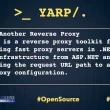Cisco Fixes Small Business (SMB) RV Series Routers Vulnerabilities
Multiple vulnerabilities in Cisco Small Business RV160, RV260, RV340, and RV345 Series Routers could allow an attacker to do any of the following:
- Execute arbitrary code
- Elevate privileges
- Execute arbitrary commands
- Bypass authentication and authorization protections
- Fetch and run unsigned software
- Cause denial of service (DoS)
Vulnerable Products
CVE-2022-20700, CVE-2022-20702, CVE-2022-20703, CVE-2022-20704, CVE-2022-20705 and CVE-2022-20706 affect the following Cisco products:
- RV160 VPN Routers
- RV160W Wireless-AC VPN Routers
- RV260 VPN Routers
- RV260P VPN Routers with PoE
- RV260W Wireless-AC VPN Routers
- RV340 Dual WAN Gigabit VPN Routers
- RV340W Dual WAN Gigabit Wireless-AC VPN Routers
- RV345 Dual WAN Gigabit VPN Routers
- RV345P Dual WAN Gigabit POE VPN Routers
CVE-2022-20699, CVE-2022-20701, CVE-2022-20707, CVE-2022-20708, CVE-2022-20709, CVE-2022-20710, CVE-2022-20711, CVE-2022-20712 and CVE-2022-20749 affect only the following Cisco products:
- RV340 Dual WAN Gigabit VPN Routers
- RV340W Dual WAN Gigabit Wireless-AC VPN Routers
- RV345 Dual WAN Gigabit VPN Routers
- RV345P Dual WAN Gigabit POE VPN Routers
Details about the vulnerabilities are as follows:
CVE-2022-20699: Cisco RV340, RV340W, RV345, and RV345P Dual WAN Gigabit VPN Routers SSL VPN Remote Code Execution Vulnerability
A vulnerability in the SSL VPN module of Cisco Small Business RV340, RV340W, RV345, and RV345P Dual WAN Gigabit VPN Routers could allow an unauthenticated, remote attacker to execute arbitrary code on an affected device.
This vulnerability is due to insufficient boundary checks when processing specific HTTP requests. An attacker could exploit this vulnerability by sending malicious HTTP requests to the affected device that is acting as an SSL VPN Gateway. A successful exploit could allow the attacker to execute code with root privileges on the affected device.
CVE-2022-20700, CVE-2022-20701, CVE-2022-20702: Cisco Small Business RV Series Routers Privilege Escalation Vulnerabilities
Multiple vulnerabilities in the web-based management interface of Cisco Small Business RV Series Routers could allow a remote attacker to elevate privileges to root.
These vulnerabilities are due to insufficient authorization enforcement mechanisms. An attacker could exploit these vulnerabilities by submitting specific commands to an affected device. A successful exploit could allow the attacker to elevate privileges to root and execute arbitrary commands on the affected system.
CVE-2022-20703: Cisco Small Business RV Series Routers Digital Signature Verification Bypass Vulnerability
A vulnerability in the software image verification feature of Cisco Small Business RV Series Routers could allow an unauthenticated, local attacker to install and boot a malicious software image or execute unsigned binaries on an affected device.
This vulnerability is due to improper verification of software images as they are installed on an affected device. An attacker could exploit this vulnerability by loading unsigned software on the device. A successful exploit could allow the attacker to install and boot a malicious software image or execute unsigned binaries on the device.
CVE-2022-20704: Cisco Small Business RV Series Routers SSL Certificate Validation Vulnerability
A vulnerability in the software upgrade module of Cisco Small Business RV Series Routers could allow an unauthenticated, remote attacker to view or alter information that is shared between an affected device and specific Cisco servers (cloudsso.cisco.com and api.cisco.com).
This vulnerability is due to improper validation of the SSL server certificate that is received when establishing a connection to specific remote servers. An attacker could exploit this vulnerability by using man-in-the-middle techniques to intercept the traffic between the affected device and the server, and then using a forged certificate to impersonate the server. A successful exploit could allow the attacker to force the affected device to download arbitrary software images and launch further attacks, combining other vulnerabilities that are described in this advisory.
CVE-2022-20705: Cisco Small Business RV Series Routers Improper Session Management Vulnerability
A vulnerability in the session management of the web UI of Cisco Small Business RV Series Routers could allow an unauthenticated, remote attacker to defeat authentication protections and access the web UI. The attacker could obtain partial administrative privileges and perform unauthorized actions.
This vulnerability is due to the use of weak entropy for session identifier generation functions. An attacker could exploit this vulnerability either by using brute force to determine a current session identifier and then reusing the identifier to take over an ongoing session or by crafting a new, valid session identifier and bypassing the whole authentication mechanism. A successful exploit could allow the attacker to take actions within the web UI with privileges up to the level of the administrative user and launch further attacks, exploiting the other vulnerabilities described in this advisory.
CVE-2022-20706: Cisco RV Series Routers Open Plug and Play Command Injection Vulnerability
A vulnerability in the Open Plug and Play (PnP) module of Cisco Small Business RV Series Routers could allow an unauthenticated, remote attacker to inject and execute arbitrary commands on the underlying operating system.
This vulnerability is due to insufficient validation of user-supplied input. An attacker could exploit this vulnerability by sending malicious input to an affected device. A successful exploit could allow the attacker to execute arbitrary commands on the underlying Linux operating system. To exploit this vulnerability, an attacker must leverage a man-in-the-middle position or have an established foothold on a specific network device that is connected to the vulnerable router.
CVE-2022-20707, CVE-2022-20708, CVE-2022-20749: Cisco RV340, RV340W, RV345, and RV345P Dual WAN Gigabit VPN Routers Command Injection Vulnerabilities
Multiple vulnerabilities in the web-based management interface of Cisco Small Business RV340, RV340W, RV345, and RV345P Dual WAN Gigabit VPN Routers could allow an unauthenticated, remote attacker to inject and execute arbitrary commands on the underlying operating system.
These vulnerabilities are due to insufficient validation of user-supplied input. An attacker could exploit these vulnerabilities by sending malicious input to an affected device. A successful exploit could allow the attacker to execute arbitrary commands on the underlying Linux operating system.
CVE-2022-20709: Cisco RV340, RV340W, RV345, and RV345P Dual WAN Gigabit VPN Routers Arbitrary File Upload Vulnerability
A vulnerability in the web-based management interface of Cisco RV340, RV340W, RV345, and RV345P Dual WAN Gigabit VPN Routers could allow an unauthenticated, remote attacker to upload arbitrary files to an affected device.
This vulnerability is due to insufficient authorization enforcement mechanisms in the context of file uploads. An attacker could exploit this vulnerability by sending a crafted HTTP request to an affected device. A successful exploit could allow the attacker to upload arbitrary files to the affected device.
CVE-2022-20710: Cisco Small Business RV Series Routers GUI Denial of Service Vulnerability
A vulnerability in the internal interprocess communication of Cisco Small Business RV Series Routers could allow an unauthenticated, remote attacker to cause a denial of service (DoS) condition in the login functionality of the web-based management interface.
This vulnerability is due to erroneously handled exceptions during failed login attempts. An attacker could exploit this vulnerability by submitting a crafted HTTP packet to an affected device. A successful exploit could allow the attacker to prevent users from logging in to the affected device. Successful exploitation of this vulnerability would not impact users who are already logged in.
CVE-2022-20711: Cisco RV340, RV340W, RV345, and RV345P Dual WAN Gigabit VPN Routers Arbitrary File Overwrite Vulnerability
A vulnerability in the web UI of Cisco RV340, RV340W, RV345, and RV345P Dual WAN Gigabit VPN Routers could allow an unauthenticated, remote attacker to overwrite certain files on an affected device.
This vulnerability is due to insufficient input validation for specific components of the web UI. An attacker could exploit this vulnerability by sending crafted HTTP requests to an affected device. A successful exploit could allow the attacker to overwrite existing files or exfiltrate confidential data by tampering with the files that are served by the web UI process.
CVE-2022-20712: Cisco Small Business RV Series Routers Upload Module Remote Code Execution Vulnerability
A vulnerability in the upload module of Cisco Small Business RV Series Routers could allow an unauthenticated, remote attacker to execute arbitrary code on an affected device.
This vulnerability is due to insufficient boundary checks when processing specific HTTP requests. An attacker could exploit this vulnerability by sending malicious HTTP requests to an affected device. A successful exploit could allow the attacker to execute code with non-root privileges on the device.
Cisco has released software updates that address these vulnerabilities. There are no workarounds that address this these vulnerabilities.











